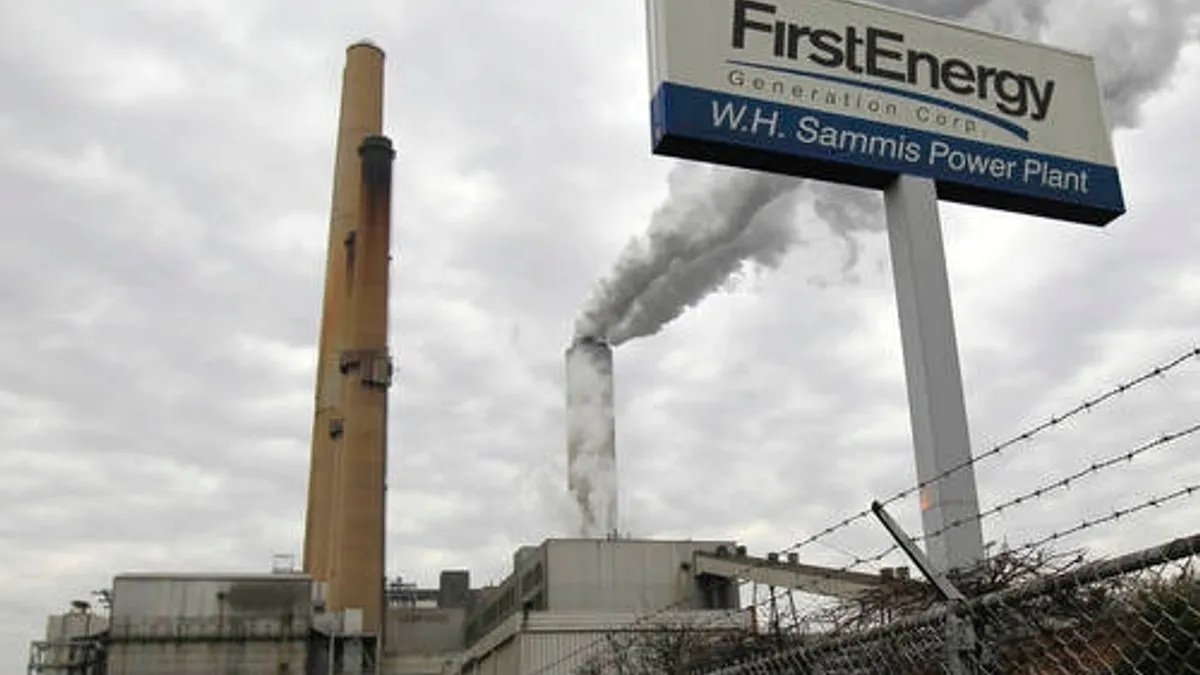Dive Brief:
- Dynegy Inc. is the latest generator to say it can meet Ohio demand more competitively than the power plant subsidies the state has been considering, proposing instead to construct more than 6,000 MW of gas-fired capacity in Buckeye State, Columbus Business First reports.
- Dynegy joins Exelon in opposing subsidy plans for FirstEnergy and American Electric Power (AEP). The two Ohio utilities have said they need income guarantees for their struggling power plants, but now a pair of interlopers threaten those proposals.
- Exelon – the largest nuclear generator in the country – has said it will provide 3,000 MW of power from reneawbles and nuclear plants to Ohio consumers, and at a price $2 billion cheaper than the eight-year settlement deal FirstEnergy brokered with stakeholders in December.
Dive Insight:
A pair of Ohio power purchase agreements that had seemed a lock just a month ago are now facing opposition from out-of-state generators who believe they can more effectively meet the state's power needs.
First Exelon, and now Dynegy, have indicated they want a shot at meeting Ohio's power demand rather than the eight-year power purchase agreements being proposed.
Last week Exelon, which owns no Ohio generation, announced it believes a deal proposed by FirstEnergy is a bad one for Ohio consumers. The company said it can provide 3,000 MW of carbon-free generation $2 billion cheaper than the settlement deal FirstEnergy brokered with stakeholders in December. And now Dynegy has made its own proposal, according to Columbus Business First.
Now, Dynegy has jumped into the game. The generator said it could save Ohio consumers and businesses $5 billion over the FirstEnergy and AEP proposals, with generation it already owns in the state. And if state regulators still want to go another direction – if they still want to pay "out of market rates," as Dynegy put it – the generator offered up another deal to replace to the plants proposed for subsidies.
"Dynegy believes that Ohioans should get something for their money," the company said in a statement this week. "At the proposed rates, Dynegy could replace the plants being subsidized under the FirstEnergy and AEP PPAs by building 6,300 MW of new, clean natural gas powered generation in Ohio, bringing new jobs to the state, increasing economic activity and development, and providing reliability and resource adequacy for decades."
FirstEnergy, for its part, told the Cleveland Plain Dealer that the Dynegy proposal "misses the point" of the plant subsidy proposal's aim to preserve a diverse fuel mix. Keeping Ohio from becoming too reliant on natural gas is a key selling point in both the FirstEnergy and AEP proposals.
"Dynegy's proposal offers few specifics and provides no assurances that its power plants in the region will continue operating over the long-term," Douglas Colafella, FirstEnergy spokesman, told the paper. "Dynegy is a power marketer from Houston with an established track record of entering and exiting competitive markets."
Dynegy has threatened to sue if the PUC approve the proposals. The independent power producer entered the state's power market last year when it purchased nine power plants from Duke Energy. The company has directly urged Gov. John Kasich (R) to push back on coal plant subsidies for its rivals.
Hearings are being held into both AEP and FirstEnergy's proposals.
Previously, FirstEnergy had reached a settlement with 15 other parties hoping to gain approval for its plan. The utility agreed to reduce the length of power purchase agreements from 15 to eight years, and included consumer bill credits to lessen the early impacts.Under the plan, customers would pay about $3.25 more per month in the first year of the power purchase agreements, but the company says they will save more than $560 million over the life of the arrangement, due mostly to expected increases in natural gas prices.
AEP has proposed a similar arrangement with 11 other parties that guarantees income for selected coal generating units in Ohio in exchange for promises to cease coal use at other facilities and develop 900 MW of renewable energy. The proposed PPAs were also trimmed to 8 years and garnered support from the Sierra Club.














